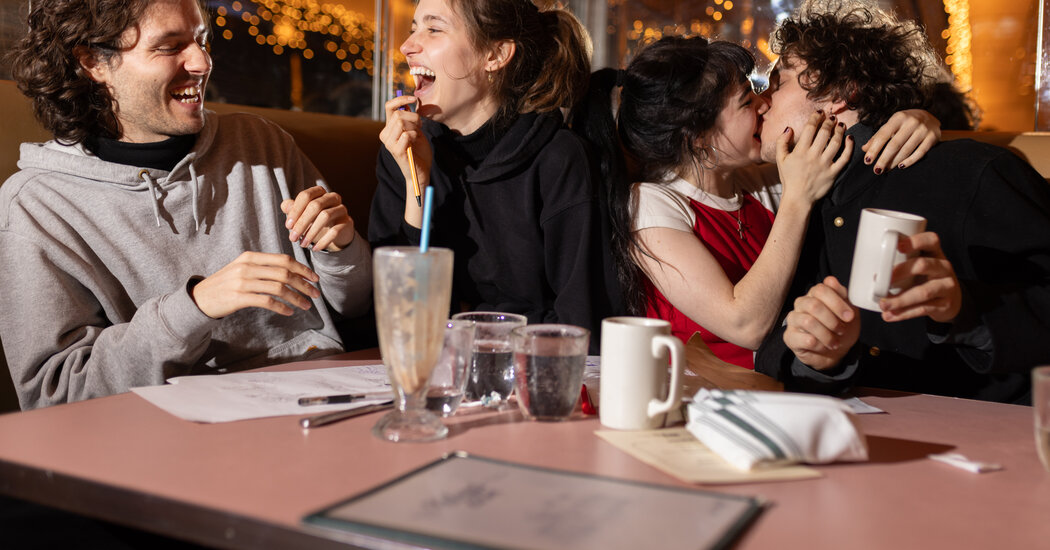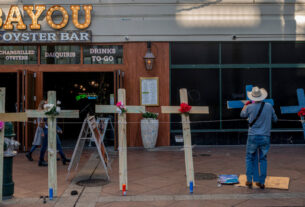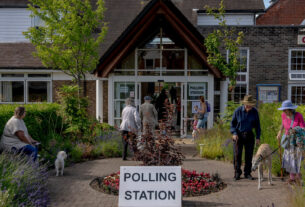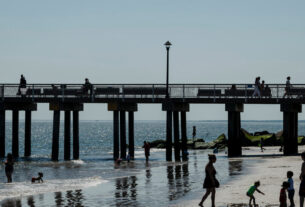You never know who you might meet in the wee, small hours of an all-night diner.
Here’s a Navy man celebrating his last night in New York City with friends before being deployed. Over there is a tipsy rock singer executing a perfect run-through of Michael Jackson’s dance moves to “Thriller.” And in comes a 60-year-old intensive-care-unit nurse and her wife, sitting down to a romantic dinner after a long night of clubbing.
There’s a chaotic cadence to the 24-hour diner — a refuge where patrons of all ages, backgrounds and tastes are welcome to bump elbows over patty melts and pancakes. Unlike the restaurant that keeps traditional business hours, the diner shape-shifts as the night wears on and different kinds of customers pour in. It can be whatever they need it to be — its menu, mood and playlist often changing from hour to hour.
All-night diners are a signature New York institution. But in a city that supposedly never sleeps, they’re disappearing as costs rise, food delivery booms and many citizens keep the earlier-to-bed schedules they developed during the pandemic. According to Yelp data, the city lost 13 percent of its more than 500 round-the-clock restaurants from February 2020 to January 2024, including favorites like Neptune Diner in Astoria, Queens, and Arch Diner near Canarsie Pier in Brooklyn.
In the midst of all those closings, at least one place was reborn: Kellogg’s Diner, a stalwart of Williamsburg, Brooklyn, from 1928. It returned in September after a half-year hiatus, with new ownership, a refurbished interior, a slightly fancier menu by the chef Jackie Carnesi — and two months later, 24-hour service.
“It was a niche that needed to be filled,” Ms. Carnesi said. “Post-pandemic, the number of 24-hour restaurants that ceased to exist left a big hole in the heart of New York City.”
To better appreciate the magic of a restaurant that never closes, I spent a Friday night at Kellogg’s, dining nonstop from 8 p.m. to 8 a.m., seeing the restaurant through each of its transformations and meeting a motley mix of customers. Surprisingly, I drew no scrutiny from the staff for my hourslong stay — a heartening reminder that no other place will welcome you as unconditionally as an all-night diner.
The Dinner Crowd
8 to 11 p.m.
With its cushiony booths, string lights, glass case of pies and neon sign glowing out front, Kellogg’s looks every inch the archetypal diner. But for my first few hours there, it felt like any other popular restaurant in prime time. Crowds waited for tables in the entryway. Groups of friends shared platters of nachos and bottles of orange wine chilled in buckets. Solo diners lingered over slices of pecan pie at the bar.
Perched on one of those bar stools was Megan Donovan, who works in advertising sales and lives on the Upper East Side. She rushed in around 9 p.m., starving after a friend’s birthday party. She had never been to Kellogg’s, but liked how classic it looked from the outside.
“There is something universal about it,” said Ms. Donovan, 27, sandwich in hand. “Every diner, I can get a BLT and I know it is going to be good.”
She lamented that the only late-night options these days seem to be fast-food chains. “I like Taco Bell fine enough,” she said, but “it is nice to be able to come and have a restaurant experience.”
A few stools down, Khoi Vinh, who works in luxury sales and lives in Clinton Hill, Brooklyn, had come by looking for several rings that he’d lost when he ate at Kellogg’s a week earlier.
“I don’t like to eat finger foods with my rings,” he said, “And so I put them on the table and left them there.” He worried they were gone forever, but not long after he ordered his chicken-fried steak, a bartender appeared with the rings — all of them.
“It is just a special place,” said Mr. Vinh, 40, slipping them on most of his fingers. “I feel in community with these people.”
The Merry Revelers
11 p.m. to 2 a.m.
The martinis and natural wines gave way to tequila shots and vodka-sodas around 11. A new crop of guests arrived either to gear up for a night out or to keep the party going.
They included Brandon Reyes, who would deploy to Italy on Monday for his next Navy posting. Four friends had descended on New York from across the country to see him off, and he had taken them to his favorite place since childhood: Kellogg’s.
“It is embedded in my culture,” said Mr. Reyes, 23, who grew up nearby. “It is part of my family. My grandmother has been coming here for years.”
He didn’t mind that the menu now included a $95 rib-eye steak, or that the furniture had been upgraded. He was just relieved that the place was still open late. Without that, he said, “it loses compatibility with the people that live here.”
His friends asked the bartender to pour them a shot of his choice. “I don’t know what I just drank,” said Mr. Reyes. “But it was delicious.”
At 1 a.m., Kellogg’s switches to a late-night menu that includes fewer items but some additions, like a Cuban sandwich and cornmeal masa pancakes. Around that time, I saw a manager take a nip from a squat flask of olive oil.
Joshua Ackley, the lead singer of the Dead Betties, a Brooklyn rock band, strolled in after celebrating his 44th birthday on the Lower East Side. “I used to play gigs at clubs in New York,” he said, “and we would be like, ‘If we lose touch, let’s all have proof of life at Kellogg’s between 5 and 7 a.m.’ ”
He missed the old version of the diner. “It was more accommodating to the people who didn’t have much money,” he said. “This is, like, $37,” he added, pointing to his chicken-fried steak (which was actually $24). “I wouldn’t pay that back in the day.”
Suddenly, the song “Thriller” came on, and Mr. Ackley proceeded to perform most of the famous dance, solo, in the front of the dining room. Few customers seemed to notice. He only bumped into a server once.
The Wild Bunch
2 to 5 a.m.
At 2 a.m., the playlist suddenly changed from Top 40 hits to 1970s pop — Abba, the Go-Go’s, Boney M. The room became noisier and more raucous as people tumbled in from bars and clubs. One woman vomited onto her table, then shrouded her head in scarves and was escorted out of the restaurant by a friend, looking like a celebrity trying to evade paparazzi. Our server shrugged, wiped up the mess and said he wished her well.
A group of recent Stanford graduates fresh from dancing at a nearby Afrobeats club appeared at Kellogg’s around 3 a.m. looking for solid food to soak up all the drinks they’d consumed.
“I love pancakes,” deadpanned Gabby Barratt, 22, a health researcher. “Apartments are too small. Everyone needs somewhere else to be.”
But the crowd wasn’t all 20-somethings. Maria Pino, 60, an I.C.U. nurse, came in with her wife after they’d spent a date night dancing at a club.
“She gets hangry,” Ms. Pino said of her wife, who used to live nearby and did not want to be named. (There would be no nightcaps, as state law prohibits restaurants from serving alcohol from 4 to 8 a.m.)
Ms. Pino loves the eccentric people she meets at all-night diners, and even witnessed a spontaneous wedding in one 10 years ago. She hoped the city would never lose these spots.
“This is not Arizona, this is not Virginia, this is New York,” she said. “New York is 24 hours. You need a place to go.”
The Stragglers and Early Risers
5 to 8 a.m.
The blinds stayed drawn through the night. But around 6 a.m., sunlight slowly crept in through the slats, reminding me how long I’d been there.
Just before that, the lighting inside the restaurant softened to a yellowish glow, a server beginning his shift dropped a breakfast menu at our table and the playlist shifted to jazz. A manager said this was his way of signaling to the inebriated that they needed to leave or quiet down. A cleaning crew swept up maps, photos and bottle caps from the night before.
Rachel Prucha and Lo Logsdon, both bartenders in Manhattan, had recently finished their shifts and were debriefing over enchiladas and espresso martinis. “This is our dinner,” said Ms. Prucha, 30. “And breakfast.”
During the pandemic, there was no place for hospitality employees to eat after work, said Mr. Logsdon, 29. He didn’t want to order delivery and pay all the various fees. “Having this place back is so heartwarming,” he said.
Then there were the guests just beginning their days, like D.Y. Kim, a project manager at Google, who had just flown back from South Korea a day earlier and was digging into a plate of pancakes and an omelet. He woke up jet-lagged and craving breakfast food, so he drove from his home in Downtown Brooklyn to Kellogg’s — one of the few places open this early.
“We don’t have diners in Korea,” said Mr. Kim, 35. “I was looking forward to an American breakfast.”
And is there any more American a place to eat it than a 24-hour diner?





